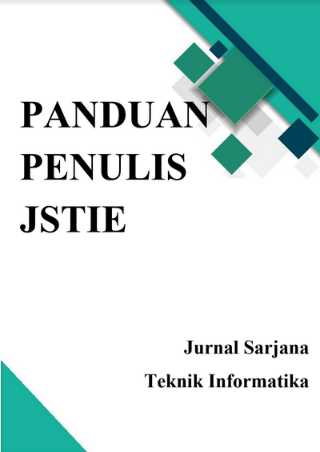PENERAPAN TEXT MINING PADA SISTEM KLASIFIKASI EMAIL SPAM MENGGUNAKAN NAIVE BAYES
DOI:
https://doi.org/10.12928/jstie.v2i3.2877Abstract
Email atau Elektronik mail merupakan salah satu fasilitas internet yang murah dan mudah digunakan untuk melakukan transfer informasi atau penyebaran informasi berupa file (mail attachment) antar pengguna internet .Tetapi tidak semua pengguna memanfaatkan email dengan baik dan benar. pengguna yang kurang baik memanfaatkan email untuk menyebarkan informasi yang tidak baik seperti virus dan iklan suatu perusahaan atau mempromosikan produk bisnis tertentu. Email yang seperti itulah yang lebih dikenal dengan email spam. Email spam dikirim ke banyak orang tanpa melakukan ijin terlebih dahulu ke pemilik email yang dituju. Berdasarkan permasalahan tersebut, maka dibuat suatu penelitian untuk mengembangkan suatu aplikasi text mining yang mampu mengklasifikasi email.
Â
Text mining merupakan proses menambang data yang berupa teks dimana sumber data biasanya didapatkan dari dokumen dan tujuannya adalah mencari kata-kata yang dapat mewakili isi dari dokumen sehingga dapat dilakukan analisa keterhubungan antar dokumen. Proses dalam text mining meliputi proses tokenisasi, stemming dan filtering. Metode pengumpulan data dengan metode kepustakaan. Tahapan pengembangan aplikasi meliputi perancangan proses, perancangan tabel, implementasi dan pengujian sistem. pengujian sistem dengan black box test dan alpha test.
Â
Dari penelitian yang dilakukan menghasilkan sebuah perangkat lunak penerapan text mining pada sistem klasifikasi email spam menggunakan metode naive bayes. Pada klasifikasi email dihitung nilai probabilitas berdasarkan kemunculan kata yang terdapat dalam data email. pengujian keakurasian sistem ditampilkan berupa grafik nilai keakurasian, false positif dan false negatif. Hasil uji coba menunjukkan bahwa aplikasi ini layak dan dapat digunakan dan memiliki nilai keakurasian sistem sebesar 89,6 %.
Â
Kata Kunci : Text Mining, Klasifikasi, Email spam, Naive BayesReferences
Graham,Paul.2002. A Plan for Spam. (http://www.paulgraham.com/spam.html , Diakses: 3 november 2012).
Feldman, Ronen.,Sanger, James.2007.The Text Mining Handbook: Advanced Unstructure Data. New York : Cambridge University Press.
Rachli, Muhamad.2007. Email Filtering Menggunakan Naive Bayes.Tugas Akhir. Program Studi Teknik Elektro, Institut Teknologi Bandung, Bandung.
Anugroho, Prasetyo. 2010. Klasifikasi Email Spam Dengan Metode Naive Bayes Classifier Menggunakan Java Programming. Skripsi. Politeknik Elektro Negeri Surabaya, Institut Teknologi Sepuluh Nopember, Surabaya.
Han, Jiawei and M. Kamber. 2001. Data Mining: Concepts and Techniques. USA: Academic Press.
Pop,Ioan.2006. An approach of the Naive Bayes classifier for the document
classification.Jurnal. Volume 14, No.4,
Downloads
Published
Issue
Section
License
License and Copyright Agreement
In submitting the manuscript to the journal, the authors certify that:
- They are authorized by their co-authors to enter into these arrangements.
- The work described has not been formally published before, except in the form of an abstract or as part of a published lecture, review, thesis, or overlay journal. Please also carefully read Journal Posting Your Article Policy.
- The work is not under consideration for publication elsewhere.
- The work has been approved by all the author(s) and by the responsible authorities – tacitly or explicitly – of the institutes where the work has been carried out.
- They secure the right to reproduce any material that has already been published or copyrighted elsewhere.
- They agree to the following license and copyright agreement.
Copyright
Authors who publish with Jurnal Sarjana Teknik Informatika agree to the following terms:
- Authors retain copyright and grant the journal right of first publication with the work simultaneously licensed under a Creative Commons Attribution License (CC BY-SA 4.0) that allows others to share the work with an acknowledgement of the work's authorship and initial publication in this journal.
- Authors are able to enter into separate, additional contractual arrangements for the non-exclusive distribution of the journal's published version of the work (e.g., post it to an institutional repository or publish it in a book), with an acknowledgement of its initial publication in this journal.
- Authors are permitted and encouraged to post their work online (e.g., in institutional repositories or on their website) prior to and during the submission process, as it can lead to productive exchanges, as well as earlier and greater citation of published work.







